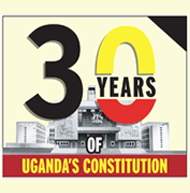News
How CA delegates clashed over the ban on political parties in Uganda
Writing about this process, in his essay, The Politics of Constitution-Making in Uganda, Aili Mari Tripp said one of the substantive issues at the heart of the constitution-making process regarded the nature of the political system in Uganda.
Justice Benjamin Odoki-led Uganda Constitution Commission (UCC) had recommended that the movement system that the National Resistance Movement/ Army (NRM/A) had introduced in 1986 be maintained. (File photo)
By: Annabel Oyera, Journalists @New Vision
__________________
The 1989-1995 Constitution-making process came with many controversial and contentious issues.
Writing about this process, in his essay, The Politics of Constitution-Making in Uganda, Aili Mari Tripp said one of the substantive issues at the heart of the constitution-making process regarded the nature of the political system in Uganda.
The key question delegates had to deal with was whether it would be a multi-party democracy or a non-party movement system.
In their report, the Justice Benjamin Odoki-led Uganda Constitution Commission (UCC) had recommended that the movement system that the National Resistance Movement/ Army (NRM/A) had introduced in 1986 be maintained, and that five years after the promulgation of the Constitution, a referendum be held on whether to open up or maintain the movement system.
Indeed, during the Constituent Assembly (CA), one of the most contentious issues addressed by delegates was the future of the country’s political system. “The multi-partyists wanted the Constitution to provide for freedom of association. The movementists felt that the country was not ready for multi-partyism and that it would fracture the country irreparably,” Tripp said.
In the end, Tripp added, CA delegates reinforced the recommendations of the Odoki-led Uganda Constitution Commission that the movement system should continue.
The debate, which was characterised by walk-outs initiated by multi-party supporters, took four days, and under Article 269 of the 1995 Constitution, the movement system was entrenched with a legal restriction on political parties. The NRM took the day with 199 delegates voting in favour of the movement system, 68 delegates opposed, and two members abstained.
Inside the CA, Jaberi Bidandi Ssali described the walkout as “unfortunate” and accused the group that walked out of betrayal.
Ssali argued that the movement system would insulate the country from the political violence and conflict that was fuelled by the multiparty system in the past.
However, in a spirited fight in support of multi-party dispensation, Adoko Nekyon, the CA delegate for Maruzi, said: “We want competition because it is cheap and it provides the best material. A multi-party system does not preclude personal quality. In fact, if anything, if you are going to be fronted by a party, you must be of high quality because no political party wants to put up a candidate who can’t win the constituency. Then you say this free-for-thing (movement system) is the best.”
Nekyon argued that the foundation of pluralism is to provide change because change is a fundamental part of human nature.
“The foundation of party democracy is to provide for change because change is a fundamental part of human nature. Speciosa Kazibwe was in the Democratic Party (DP), and she has changed to the National Resistance Movement (NRM). Ruhakana Rugunda, Bidadi Ssali and Kirunda Kivejinja — all have changed from Uganda People’s Congress (UPC) and are now for a one-party system. Above all, President Yoweri Museveni has not only changed, he has gone through a metamorphosis. He was in DP first. Then UPC, Front for National Salvation (FRONASA), Uganda National Liberation Front (UNLF), Uganda Patriotic Movement (UPM) and NRM. I don’t know what’s next,” Nekyon added.
In December 2004, the NRM government presented before Parliament several constitutional amendments, including the lifting of the restrictions on political parties that the 1995 Constitution had placed on pluralism under Article 269. This opened a new chapter for political party dispensation in Uganda.
VISION GROUP’S MAGAZINE
To commemorate the 30th anniversary of Uganda’s Constitution promulgation, Vision Group will, on October 7, publish a magazine that highlights the milestones covered under the Constitution.
When the National Resistance Army overran Kampala under the leadership of President Museveni, the journey to transition to constitutional rule started almost immediately, with the issuance of Legal Notice No. 1 of 1986. The legal notice that repealed the 1967 constitution effectively established the legal framework for the NRM government, vesting legislative powers in the National Resistance Council (NRC) and outlining the code of conduct for the NRA.
The Constituent Assembly, which comprised representatives elected by the people under the chairmanship of James Wapakhabulo on September 22, 1995, promulgated the Constitution, effectively replacing the one of 1967.
In the run-up to October 7, New Vision will publish stories that showcase the country’s progress under the constitution.